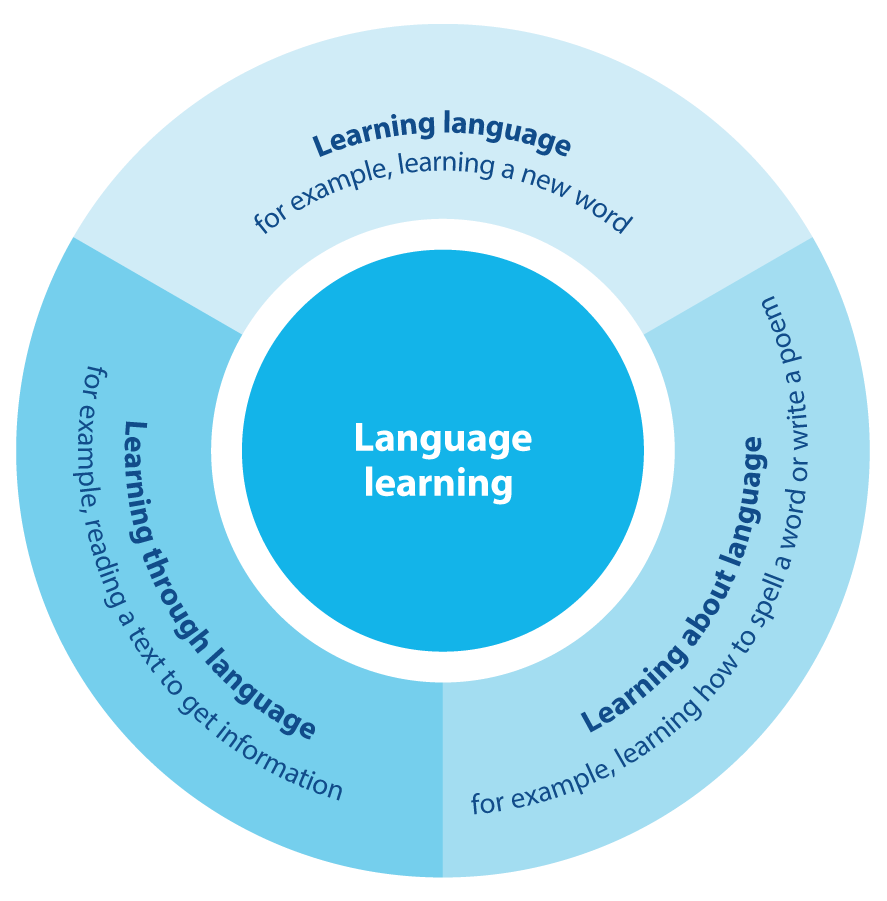Language Programs Overview
All teachers are language teachers and therefore they have the responsibility towards facilitating language development and cognitive skills necessary for academic progress. The language scope and sequence document provide a balance in:

- Learning language
- Learning About language
- Learning Through Language (Halliday, 1980)
The overall pedagogy promotes integrated language development and focuses on language as a transdisciplinary element throughout the curriculum. The benchmarks for each level are structured according to the IB PYP Scope and Sequence document as follows:
- Oral Language: Listening and Speaking
- Visual Language: Presenting and Viewing
- Written Language: Reading
- Written Language: Writing
Oral language encompasses all aspects of listening and speaking. Opportunities for learning about and learning through oral language occur in all areas of the curriculum. Students are provided with authentic opportunities to develop their skills. These include assemblies, presentations, school exhibitions, annual IB Language Policy Rupani Academy productions, and performances in the additional language, the student leadership program, and a range of classroom learning experiences as well as an enriched Performing Arts program that includes singing across each year level. Assessment of speaking and listening is completed in contexts including group work, partner work, and whole-class work across the curriculum, particularly in cooperative learning tasks.
The receptive process of viewing and the expressive process of presenting are closely connected. Students are provided with learning experiences to develop their ability to understand how images and languages interact to convey ideas, values, and beliefs. The ICT resources across the school allow students to access visual texts including websites, videos, graphs, maps, diagrams, and charts. Learning to interpret, understand, and use different media are invaluable life skills.
Reading is a developmental process that involves constructing meaning from text. Rupani Academy believes that “Reading gives us Wings” for the teaching of reading. We use I Can Read University Phonetic resources which focus on reading skills ranging from 3 years to 12 years. We provide opportunities for students to encourage reading habits through reading for pleasure and reading marathons with their parents. Children learn to read by reading and as such the school delivers a daily literacy block comprising explicit teaching of reading. Through language experience, modeled reading, shared reading, guided reading, and independent reading sessions, learners engage with appealing texts appropriate to their experiences and developmental phase. Assessment drives the teachers to identify the appropriate levels for students. Some assessment tools used include Running Records, PROBE, TORCH, ACER, and anecdotal notes. Writing is primarily concerned with communicating meaning and intention to an audience. Children learn to write by writing. The school provides modeled writing, shared writing, four square writing, independent writing, free writing sessions through which the students learn the mechanics of writing including spelling, grammar, text structures and features, the writing process and developing voice. Regular moderation throughout the year in and across teaching teams occurs to ensure consistency of assessment and planning.
The Rupani Academy provides a range of professional development that supports effective educators and collaborative learning communities. The professional development opportunities include face-to-face and online workshops, webinars, curriculum review, assessment moderation, staff meetings, off-site workshops, conferences, training workshops based on the literacy language, and e-learning resources.
Students are given multiple opportunities to learn language and literature. They have been involved in many different literacy activities such as daily read-aloud, word-rich walls, using classroom libraries, writer’s workshop, and guided reading groups. Students use language for collaborating with their peers and their teachers. They also practice language use when presenting their thoughts and ideas. Particularly, students with the same interest are grouped to cooperate and strengthen their linguistic skills such as writer club, reader club, poetry club, and orators club. Teachers can fill in academic language gaps when necessary using this diagnostic assessment. Students also participate in differentiated learning centers daily including, but not limited to: MAP, Research, Self-Selected Reading, Word Works/Word Study, ReadWorks.org, Independent Writing, and Listening. Students are encouraged to use their language as a means to inquiry and learning.
At Rupani Academy we believe that it is important for staff to communicate and collaborate regularly with families to support students’ academic, language, and social-emotional learning.
Within the education setting, there are many stakeholders which play a role in interacting with the student in a teaching and learning context. The student themselves, the teacher, parents, and other academic staff all influence the student in their learning and can play a role in developing academic skills. Parental involvement is a significant factor influencing students’ educational development. Rupani Academy uses many methods to engage parents in the language development of their children. The language of communication with parents is English, but Urdu and even local languages are used as means of communication. Students are given assignments to sit with parents and listen to the stories, folk tales, and poetry in local languages and translate them into the target language.
- All Rupani Academy IB policies will be shared with all stakeholders via the school official webpage and in WhatsApp groups
- All Rupani Academy IB policies will be reviewed annually during IB Pre-planning workshops
Last Reviewed: 15 January, 2023
Developed and Reviewed by:
- Ms. Najmi Khatoon - PYPC
- Ms. Salma Jan - MYPC
- Sir Riaz Hussain
- Miss Uzma
- Miss Nigahat
Reference:




